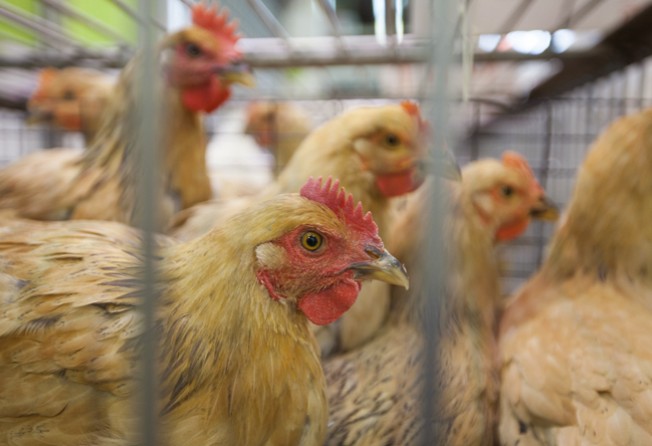Trading continues as usual at Shenzhen wet markets despite discovery of H7N9 virus
Live poultry trading

Trading of live chicken continued at the poultry stall at Shenzhen’s Kangqiao market until 9am on Thursday, where two samples had been tested positive for H7N9 bird flu virus.
Guangdong health authorities announced on Wednesday that two samples collected from chicken excrement and a feather-plucking machine at the stall had tested positive for the virus. But the operator of the stall said she was only told to suspend business on Thursday morning.
The stall is the only poultry stall at Kangqiao market in the Nanwan neighbourhood in Shenzhen. The Health and Family Planning Commission of Guangdong said on Wednesday that H7N9 had been detected in three samples taken from poultry stalls at two wet markets in the city’s Longgang district. An infected blood sample came from a chopping board at a stall selling live chickens at a Henggang market.
The commission also warned that the risk of the disease spreading in the province was high and advised the public to stay alert.
As of noon on Thursday, live poultry trading continued as normal at several wet markets across Shenzhen.
“No one told us to stop selling chickens. We feel worried (about the disease) but we have to make a living,” a female vendor said at a wet market in Bao’an district.
The municipal government has said Shenzhen could not be confirmed as the source of the outbreak, which has seen two confirmed cases in Hong Kong.
University of Hong Kong microbiologist Ho Pak-leung said he believed the virus was spreading in Guangdong and surrounding areas, and that he suspected the Longgang markets may have been responsible for the infection of the first case in Hong Kong, 36-year-old Indonesian domestic helper Tri Mawarti. The woman had killed and cooked a live chicken at a flat near one of the infected markets.
The second patient was an 80-year-old Hong Kong man who lives in Shenzhen, who had not handled live chickens. However his family bought a slaughtered chicken near Fuyogn in Baoan district, far from the positive samples.
Ho has urged Hong Kong to halt live poultry imports from the mainland. Currently only imports from three Shenzhen farms have been suspended.